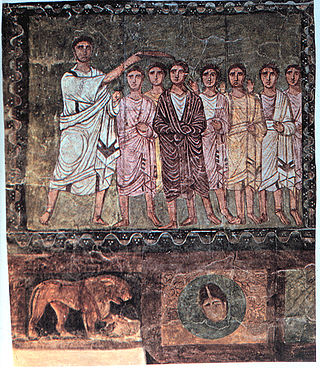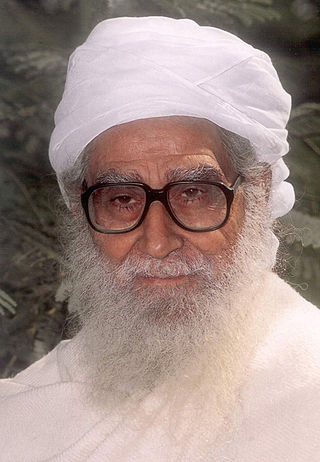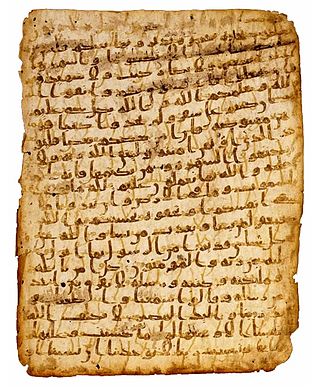
In Abrahamic religions, a messiah or messias is a saviour or liberator of a group of people. The concepts of mashiach, messianism, and of a Messianic Age originated in Judaism, and in the Hebrew Bible, in which a mashiach is a king or High Priest traditionally anointed with holy anointing oil.

The Quran, also romanized Qur'an or Koran, is the central religious text of Islam, believed by Muslims to be a revelation from God. It is organized in 114 chapters, which consist of verses. In addition to its religious significance, it is widely regarded as the finest work in Arabic literature, and has significantly influenced the Arabic language.

In Islam, Jesus is believed to be the penultimate prophet and messenger of God and the Messiah sent to guide the Children of Israel with a book called the Injīl.
In the Quran, Jesus is described as the Messiah, miraculously born of a virgin, performing miracles, accompanied by his disciples, rejected by the Jewish religious establishment, but not as crucified or dying on the cross, rather as miraculously saved by God and ascending into heaven.
The Quran unequivocally and repeatedly rejects the idea that Jesus was murdered or even crucified by the authorities.

Translations of the Qurʻan are considered interpretations of the scripture of Islam in languages other than Arabic. The Qurʻan was originally written in the Arabic language and has been translated into most major African, Asian and European languages.
The Battle of Badr, also referred to as The Day of the Criterion in the Qur'an and by Muslims, took place on March 15, 624 CE, near the present-day city of Badr, Al Madinah Province in Saudi Arabia. Muhammad, commanding an army of his Sahaba, defeated an army of the Quraysh led by Amr ibn Hishām, better known among Muslims as Abu Jahl. The battle marked the beginning of the six-year war between Muhammad and his tribe. Before the battle, the Muslims and the Meccans had fought several smaller skirmishes in late 623 and early 624.

Adam is believed to have been the first human being on Earth and the first prophet of Islam. Adam's role as the father of the human race is looked upon by Muslims with reverence. Muslims also refer to his wife, Ḥawwāʾ, as the "mother of mankind". Muslims see Adam as the first Muslim, as the Quran states that all the Prophets preached the same faith of Islam.
In Islam, Qirāʼah, are different linguistic, lexical, phonetic, morphological and syntactical forms permitted with reciting the holy book of Islam, the Quran. Differences between Qiraʼat are slight and include varying rules regarding the prolongation, intonation, and pronunciation of words, but also differences in stops, vowels, consonants, and less frequently entire words. Qiraʼat also refers to the branch of Islamic studies that deals with these modes of recitation.
Following is a list of English translations of the Quran. The first translations were created in the 17th and 19th centuries by non-Muslims, but the majority of existing translations have been produced in the 20th and 21st centuries.

Wahiduddin Khan, known with the honorific "Maulana", was an Indian Islamic scholar and peace activist and author known for having written a commentary on the Quran and having translated it into contemporary English. He was listed in "the 500 Most Influential Muslims" of the world. He was also the founder of the Centre for Peace and Spirituality (CPS). In 1993, he asked the Muslims to relinquish claims over Babri Masjid site. Khan had also embarked on a peace march through Maharashtra along with Sushil Kumar and Chidanand Saraswati post the demolition of the Babri Masjid. Khan wrote over 200 books on several aspects of Islam and established the Centre for Peace and Spirituality to promote interfaith dialogue.

Mirza Tahir Ahmad was the fourth caliph and the head of the worldwide Ahmadiyya Muslim Community. He was elected as the fourth successor of the founder of the community, Mirza Ghulam Ahmad. He was elected on 10 June 1982, the day after the death of his predecessor, Mirza Nasir Ahmad.
Muslim scholars have developed a spectrum of viewpoints on science within the context of Islam. The Quran and Islam allows much interpretation when it comes to science. Scientists of medieval Muslim civilization contributed to the new discoveries in science. From the eighth to fifteenth century, Muslim mathematicians and astronomers furthered the development of almost all areas of mathematics. At the same time, concerns have been raised about the lack of scientific literacy in parts of the modern Muslim world.
Criticism of the Quran is an interdisciplinary field of study concerning the factual accuracy of the claims and the moral tenability of the commands made in the Quran, the holy book of Islam. The Quran is viewed to be the scriptural foundation of Islam and is believed by Muslims to have been sent down by God (Allah) and revealed to Muhammad by the archangel Jabreel, also spelt Jibraeel (Gabriel). It has been subject to criticism both in the sense of being studied by mostly secular Western scholars and in being found fault with.

Islamic holy books are certain religious scriptures that are viewed by Muslims as having valid divine significance, in that they were authored by God (Allah) through a variety of prophets and messengers, including those who predate the Quran. Among the group of religious texts considered to be valid revelations, the three that are mentioned by name in the Quran are the Tawrat, received by prophets and messengers amongst the Children of Israel; the Zabur (Psalms), received by David; and the Gospel, received by Jesus. Additionally, the Quran mentions God's revealing of the Scrolls of Abraham and the Scrolls of Moses.
The UCOII is one of the main Italian Islamic association.
Masjid Hamza is a mosque and Islamic community center located at 200 Stuart Avenue, Valley Stream, New York. It has a K–6 school system called "Hamza Academy", and has a mosque. The masjid is located fifteen minutes away from John F. Kennedy International Airport and serves about 1,400 families. The masjid offers use of the masjid for the five daily prayers, adult and children's Quran classes, and Taraweeh in the month of Ramadan. The masjid originally started as a 2 bedroom house, but as a result of the growing Muslim community in Valley Stream, expanded to a bigger building in 2007. In a2015 annual fundraiser, the masjid announced plans for expansions, which they did by purchasing 3 adjacent properties
Ilyās was a prophet and messenger of God (Allah) who was sent to guide the Children of Israel. He was given the prophetic mission to prevent people from worshipping idols. Ilyas is the prophetic predecessor to Alyasa. Some Islamic scholars believe, that Ilyas is from the progeny of Harun (Aaron).

There exist Ahmadiyya translations of the Quran in over 70 languages. Portions of the scripture have been translated into multiple other languages. The Lahore Ahmadiyya Movement has produced translations into at least 7 languages. The period of the late 1980s and the early 1990s saw an acceleration in the number of translations being produced by the Ahmadiyya movement.

'Ahmadiyya under the spiritual leadership of the caliph in London is an Islamic community in China. Although the history of the Ahmadiyya movement in China starts in the early 20th century, reportedly during the lifetime of the first caliph of the movement, Hakeem Noor-ud-Din, there are no known organized Ahmadi communities in existence, besides a number of refugees, students and expatriates. The Chinese section of the movement is itself based in Surrey, United Kingdom, as opposed to being based in China.
Mustafa Khattab is a Canadian–Egyptian Muslim scholar, author, youth mentor, public speaker, imam, and university chaplain. He holds a professional ijâzah in the Ḥafṣ style of recitation. He is known for his translation of the Quran in "The Clear Quran" series.









